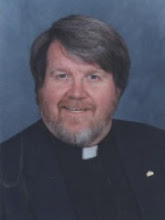
In the closing minutes of the first episode, a young machine-gunner on Guadalcanal reflects on a particularly fierce battle in which he killed many Japanese. He asks the very difficult question faced by warriors -- though one might reconcile these actions with God, how does one square it with oneself for participation in such actions?
It may be exactly because we have difficultly forgiving ourselves AND one another, as well as living from that forgiveness, that we need the voice of God from outside our lives, outside even our own experience, to speak that forgiving word.





As one born within six months of the battle portrayed, I was enlightened by the pronounced highlighting of racism in the movie, seemingly promoted by the military leadership to dehumanize the enemy. And, as a child of the era, I remember the traces of this prejudice amongst my own family's warriors who survived these battles in either European and Pacific theatres, after they returned from the chaos. A later scene was horrid, and is an indictment of a collectively sinful world that considers shooting an unarmed soldier to death as merciful. Where does "just" war theology take us?
ReplyDeleteJust War --
ReplyDeleteIs it a question of the general and the specific? In general, a war might fall into the "just war" category, but the specific acts -- the murder, the violence to body and soul on all sides as well as to civilians, the "inhumanity" of war, are they always evil?